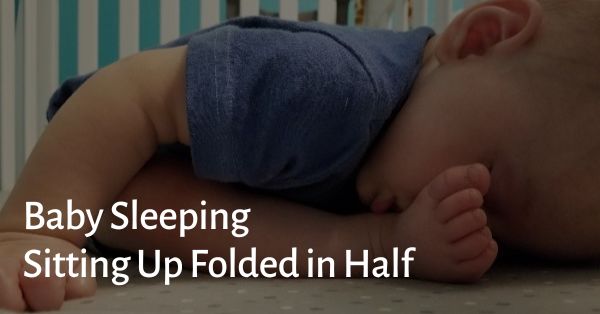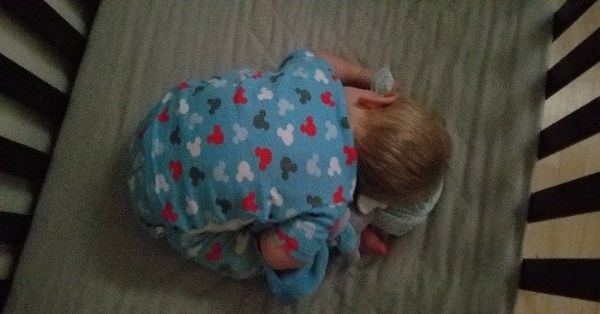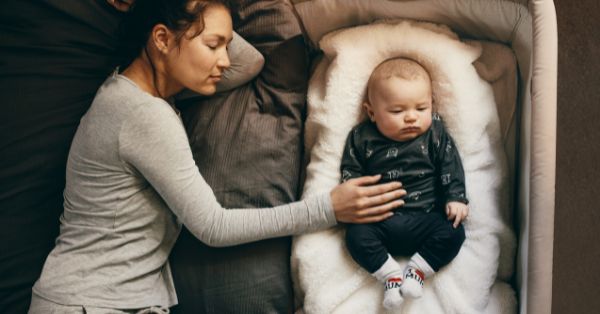“Sleep when the baby sleeps.” Is a saying that is said too many times to new parents. Never mind the cleaning and catching up on chores, sleeping positions are the biggest worry for many parents. What happens if they get stuck, hurt or worse? So should you worry if your baby is sleeping sitting up folded in half?

My Baby is Sleeping Sitting Up Folded in Half
There are many odd positions your baby can get into during their sleep but if your baby fell asleep sitting up folded in half it isn’t a major concern yet you must ensure their airways are not compromised and they are free from bedclothes and pillows.
Baby and Sleeping Positions
You are on cloud nine, watching your beautiful bundle become tired, and as their eyes droop so do yours only to be startled awake by noticing their position. Sleeping sitting up for many infants can be common. But how on earth are they comfy? Is it even safe to leave them in that position? Before you fill your mind with anxiety-ridden what-ifs and buts, let’s look at common baby sleeping positions and how to ensure the safety of your little human.
Sleeping Positions – Can My Baby Sleep Folded in Half?
As research has developed it has been found that putting a sleeping baby to lay on their back is the safest way to help prevent SIDs. Since this research was founded the rate of infant death has dropped dramatically so it is obvious that sleeping positions have a major role to play.
As your baby grows you will notice they have enhanced their skills to roll, toss and turn in their sleep. This is perfectly normal behavior but before you go in to place them on their back you can be assured that they are capable of finding their comfortable position and will still be safe in their slumber.
One position we are going to concentrate on is when your baby is sleeping sitting up folded in half. You will find that if you ask around this sleeping position is very common indeed and let’s be honest the cutest thing to see.
Nevertheless even whilst they are snoring in their cuteness you may worry that they are compromising their airway or will wake up with a sore neck or back.
Providing that your baby’s airways are free and their respiration is normal, sleeping in this pattern is not a cause for concern. It is probably their comfortable position. Just like we have that one way we all like to sleep, whether it’s on our bellies or side your baby is showing preference as to what they find comfortable.
Why Does My Baby Sleep Folded in Half?

The definitive answer to this question is comfort. We are taught that the safest way to place our babies to sleep is on their backs. Yet they may have other plans.
You have gently placed your bub down and creep out of their room but as you back away from the crib they start tossing and turning. This is purely down to them finding a comfy position to drift off into their little dreamland. You may find that proceeding to correct their position wakes them and they wriggle back into their preferred position making you feel anxious when it comes to your bedtime.
A lot of the time there are reasons for a restless bub whilst they find their comfy spot.
- Pain – if they have an injury or a pain anywhere sleeping on their back may enhance the pain so like us they will avoid it at all costs.
- Comfort – many sleeping babies tend to face the door, this is because their instincts tell them that’s where you are. They spent 9 months inside your body, listening to your heart and voice is the biggest comfort to your baby.
- Space – it is no surprise that giving a baby a bigger space to settle may startle them. Cooped up nice, safe and warm in your womb they had to find ways to sleep in the most confined space so sleeping scrunched up is normal for them.
- Burrowing – we are told that covers are a no go when settling a baby down to sleep yet some babies can only drift off if they burrow their faces. Whether it’s in your clothing or neck when it comes to the crib the only way they may feel safe is by covering their squishy faces. Cue mom panic attack!
As a newborn, my daughter used to hold her face tight against me as she slept. Now she is 7 months old and is an active burrower. She puts years on me when I glance at her monitor to find that her snuggy is over her face. I usually allow her to have it until she’s in a deep sleep then remove it before bed but the amount of times I race to pull it away from her face is uncountable. Recently I have swapped her thick snuggy to one with holes so I know her breathing is not compromised. Needless to say, I still encourage it to be off her face.
Other Odd Baby Sleeping Positions
From the ordinary to the downright peculiar, babies have this knack for finding the most unusual ways to get their snooze on. You’d be surprised how many quirky poses your little one might end up in, all in the name of a good nap. Some of these oddball positions are truly picture-worthy, but they also come with their fair share of concerns. After all, comfort is one thing, but safety? That’s a whole different ballgame.
- Starfish – Arms and legs splayed out, taking up as much crib real estate as possible. Stretched out in every direction.
- Surfer – legs or arms are sticking out of the crib.
- Undercover spy – covers have to be up on their face, as you remove them they pull them back.
- Chilled – sleeping on their back with arms behind their head.
- Ostrich – bum in the air.
- The froggy: Little legs bent, feet flat. It’s like they’re ready to leap off any second!
- The banana: Curved like they’re just waiting to be peeled.
- The pretzel: Twisted and tangled. Makes me wonder how they managed it!
- The upside-down: Their head’s where their feet should be. Someone missed the memo!
| Position | Recommended? | Risks |
| Froggy | No | Could raise the SIDS risk |
| Starfish | No | Could raise the SIDS risk |
| Banana | No | Could raise the SIDS risk |
| Pretzel | No | Could raise the SIDS risk |
| Upside-down | No | Could raise the SIDS risk |
When To Change Baby’s Sleeping Position

So after watching your baby fall asleep in the most awkward position your thoughts turn to changing their position but you have that undeniable fear of waking them.
There are some factors that will need your immediate attention to keep your baby safe.
- Check their airways are not compromised and their breathing is regular. If your baby takes a breath every 10 seconds then they will be fine any longer than this and you should straighten them out immediately.
- Loose bedding or clothing as well as soft toys should be removed once they are asleep. This will reduce the risk of suffocation.
- Note the sounds your baby makes they may groan if uncomfortable, but on the whole sleeping folded over looks more uncomfortable than it is.
If you are still feeling uneasy about their choice of sleeping position then seek advice from professionals and other moms. You are not the only one in this boat.
Sudden Infant Death Syndrome
Sudden infant death syndrome is the unexplained death of a young baby/child whilst they are asleep. This is why as parents, we find going to sleep the most anxious part of parenting. You may have found yourself exhausted, eyes burning yet you can’t pull yourself away from your baby as they sleep. To get one thing straight, these feelings are totally normal and not an unknown phenomenon.
Before your baby turns 12 months old you are given strict instructions of how they should be sleeping. The general rules are that your baby should be placed on their back without any loose clothing, blankets or pillows, this is to help reduce the risk of suffocation.
As your baby grows the risk of SIDs becomes less. From 12 months the rates of infant death are known to decrease dramatically as your baby increases their skills like rolling and their ability to move during the night. Although it is imperative that you keep loose bed covers and pillows out of their crib.
What Causes Such Things?
Thanks to ongoing research we are more understanding as to why these horrific events happen.
Read the points below to help you understand what factors contribute to SIDs.
- Accidental suffocation – when a baby’s airways are compromised by clothing, covers or teddy’s.
- Sleeping positions – if your baby is in an awkward position they could block their airways. Which is why we have addressed the question “is it ok for my baby to sleep folded over?”
- Babies born with a lower birth weight.
- If moms have smoked during pregnancy.
Wrapping Up
If your baby is sleeping sitting up folded in half then there is no reason to panic. This is clearly comfortable for them and providing their airways and breathing is normal you shouldn’t worry.
For more details around SIDs your healthcare provider will be able to advise you best as they can visit your home and see where your bubs is resting. They are trained to give tips and reassurance so if in doubt ask.
Easier said than done I totally understand the anxiety baby sleeping positions can cause us moms. If you feel uncomfortable then by all means proceed to changing their position but as your baby grows you will learn what they prefer and how best they feel comfy.
More to read:
- Can You Microwave Breast Milk?
- How Long Is Reheated Breast milk Good For?
- Baby Pushing Bottle Away But Still Hungry
- How To Make Your Baby Stop Grinding Teeth
FAQs
? How often do babies typically change their sleeping positions?
Babies can be quite restless, especially during the REM (Rapid Eye Movement) phase of sleep. It’s not unusual for babies to change their position multiple times throughout the night. This activity can become more prominent as they grow and become more mobile. Factors influencing this include their comfort, any disturbances, or simply their developmental stage.
? What are the recommended sleeping environments for babies?
The ideal environment for a baby to sleep in includes:
- A firm and flat mattress, fit snugly into a crib or bassinet.
- A room temperature between 68°F and 72°F (20°C and 22°C).
- Soft, ambient noises or silence.
- A dim or dark room with minimal light interference.
- Keeping potential allergens, like pets, out of the room.
? At what age do babies typically start rolling over in their sleep?
Babies usually start to roll over from their tummy to their back as early as 4 months. By 6 months, many babies can roll from their back to their tummy as well. Once they start rolling, it’s crucial to ensure their sleeping space remains safe and free of potential hazards.
? Does what the baby eats impact their sleep?
Yes, what a baby eats can impact their sleep. For instance, if a baby has a sensitivity or allergy to something they consumed, it might disturb their sleep. Moreover, overfeeding or underfeeding can also affect a baby’s sleep.
? How much sleep does a newborn need in a day?
Newborns sleep a lot but in short bursts. On average, a newborn might sleep between 14 to 17 hours a day, broken up by frequent wakings for feedings. This pattern often continues until they’re about 3 months old.
? Do feeding patterns affect baby sleep?
Absolutely! A baby’s sleep can be significantly affected by their feeding patterns. A hungry baby will wake up more frequently. Establishing a regular feeding routine can help in setting a more predictable sleeping schedule. As babies grow and begin solid foods, sleep patterns might shift as digestion patterns change.
? Why do some babies resist sleep even when they’re clearly tired?
Resisting sleep is a common behavior seen in babies. Reasons might include:
- Overstimulation.
- Environment changes like a noisy room.
- Growth spurts or developmental milestones.
- Sleep regressions at certain ages.
- Uncomfortable conditions like teething or diaper rash.
? What’s the importance of a bedtime routine for babies?
A consistent bedtime routine can be a game-changer. It helps signal to the baby that it’s time to wind down and sleep. This routine can include activities like a warm bath, reading a story, or playing soft lullabies. Over time, babies begin to associate these activities with sleep.
? Can white noise machines help babies sleep better?
Many parents swear by white noise machines. The consistent sound can mimic the noises in the womb, providing a familiar and soothing environment. It can also drown out household or street noises that might disturb a baby’s sleep.
? Does music help babies sleep better?
Soft and soothing music can indeed help babies fall asleep and even improve the quality of their sleep. Lullabies or white noise machines are common tools parents use to create a calming sleep environment.
?️ How does room temperature impact a baby’s sleep quality?
Room temperature plays a vital role in a baby’s sleep quality. If a room is too cold or too hot, it can make a baby restless. The ideal room temperature for a baby’s sleep is between 68°F and 72°F (20°C and 22°C). Ensuring a comfortable temperature will help promote deeper, more restful sleep.
?️ Is there a specific age when sleep training is most effective?
Most experts believe that babies are ready for sleep training between 4 to 6 months. By this age, most infants can sleep through the night and have more predictable sleep patterns. However, the right age might vary depending on the child and the family’s needs.
? How does breastfeeding impact a baby’s sleep?
Breastfeeding can affect baby sleep in various ways. Breastmilk contains substances that can promote sleep. On the other hand, breastfed babies might wake more frequently to feed compared to formula-fed babies. It’s essential to find a balance that ensures the baby gets adequate nutrition while also maintaining a sustainable sleep pattern for both baby and mom.
? Is it safe to feed my baby right before bedtime?
Feeding your baby right before bedtime can help them feel full and content, promoting better sleep. For many parents, this becomes a part of the nightly routine. However, if you’re bottle-feeding, ensure your baby is in an almost upright position to minimize the risk of ear infections.
? How do illnesses affect baby sleep?
Illnesses can significantly disrupt a baby’s sleep. Colds, ear infections, or teething can make a baby more restless or cause more frequent wake-ups. It’s crucial to ensure the baby is comfortable, perhaps elevating the head slightly to ease congestion or using doctor-recommended remedies to soothe any discomfort.
? What are some recommended resources for concerned parents about baby sleep?
There are several excellent resources for parents:
- Pediatricians or family doctors can offer guidance.
- Baby sleep books by renowned authors, such as Dr. Harvey Karp.
- Parenting workshops and classes that address baby sleep.
- Online forums or groups where parents share experiences and solutions.